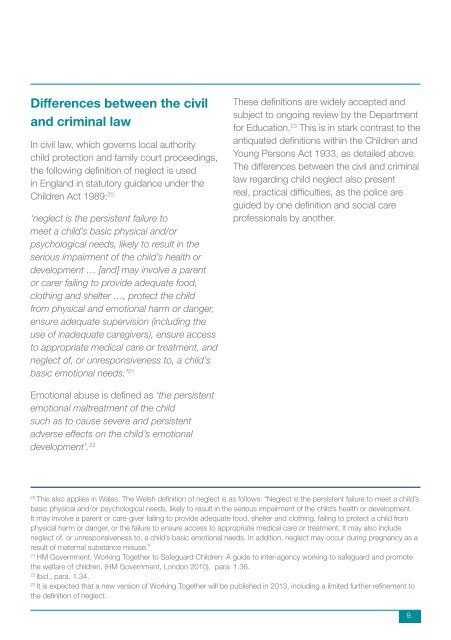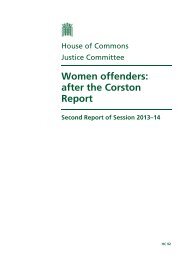The criminal law and child neglect: - Action for Children
The criminal law and child neglect: - Action for Children
The criminal law and child neglect: - Action for Children
- No tags were found...
You also want an ePaper? Increase the reach of your titles
YUMPU automatically turns print PDFs into web optimized ePapers that Google loves.
Differences between the civil<strong>and</strong> <strong>criminal</strong> <strong>law</strong>In civil <strong>law</strong>, which governs local authority<strong>child</strong> protection <strong>and</strong> family court proceedings,the following definition of <strong>neglect</strong> is usedin Engl<strong>and</strong> in statutory guidance under the<strong>Children</strong> Act 1989: 20‘<strong>neglect</strong> is the persistent failure tomeet a <strong>child</strong>’s basic physical <strong>and</strong>/orpsychological needs, likely to result in theserious impairment of the <strong>child</strong>’s health ordevelopment … [<strong>and</strong>] may involve a parentor carer failing to provide adequate food,clothing <strong>and</strong> shelter …, protect the <strong>child</strong>from physical <strong>and</strong> emotional harm or danger,ensure adequate supervision (including theuse of inadequate caregivers), ensure accessto appropriate medical care or treatment, <strong>and</strong><strong>neglect</strong> of, or unresponsiveness to, a <strong>child</strong>’sbasic emotional needs.’ 21<strong>The</strong>se definitions are widely accepted <strong>and</strong>subject to ongoing review by the Department<strong>for</strong> Education. 23 This is in stark contrast to theantiquated definitions within the <strong>Children</strong> <strong>and</strong>Young Persons Act 1933, as detailed above.<strong>The</strong> differences between the civil <strong>and</strong> <strong>criminal</strong><strong>law</strong> regarding <strong>child</strong> <strong>neglect</strong> also presentreal, practical difficulties, as the police areguided by one definition <strong>and</strong> social careprofessionals by another.Emotional abuse is defined as ‘the persistentemotional maltreatment of the <strong>child</strong>such as to cause severe <strong>and</strong> persistentadverse effects on the <strong>child</strong>’s emotionaldevelopment’. 2220This also applies in Wales. <strong>The</strong> Welsh definition of <strong>neglect</strong> is as follows: “Neglect is the persistent failure to meet a <strong>child</strong>’sbasic physical <strong>and</strong>/or psychological needs, likely to result in the serious impairment of the <strong>child</strong>’s health or development.It may involve a parent or care-giver failing to provide adequate food, shelter <strong>and</strong> clothing, failing to protect a <strong>child</strong> fromphysical harm or danger, or the failure to ensure access to appropriate medical care or treatment. It may also include<strong>neglect</strong> of, or unresponsiveness to, a <strong>child</strong>’s basic emotional needs. In addition, <strong>neglect</strong> may occur during pregnancy as aresult of maternal substance misuse.”21HM Government, Working Together to Safeguard <strong>Children</strong>: A guide to inter-agency working to safeguard <strong>and</strong> promotethe welfare of <strong>child</strong>ren, (HM Government, London 2010), para. 1.36.22Ibid., para. 1.34.23It is expected that a new version of Working Together will be published in 2013, including a limited further refinement tothe definition of <strong>neglect</strong>.9.
















